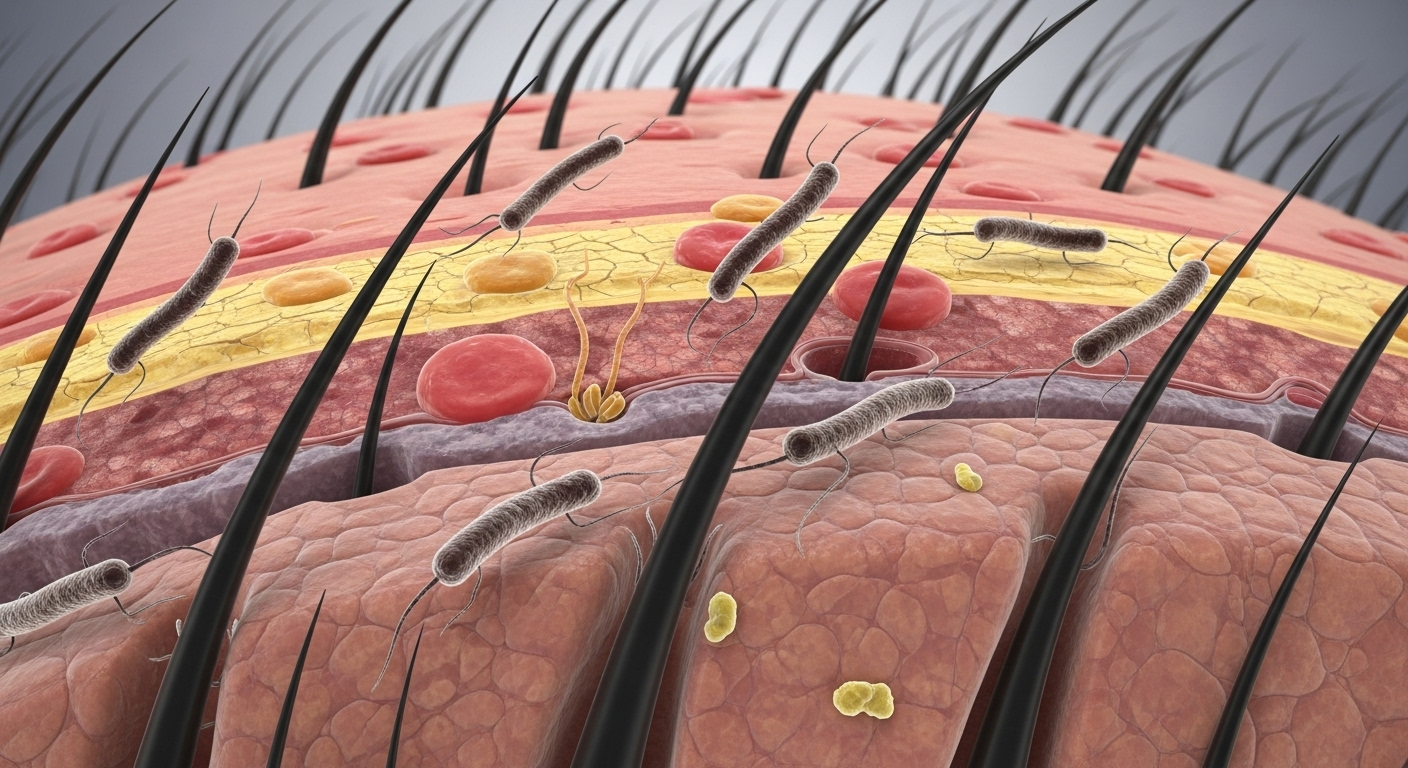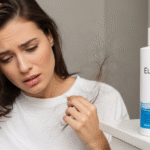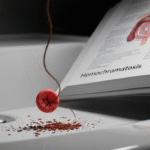If you're experiencing unexplained hair thinning, you may be asking: does H. pylori cause hair loss? While this stomach bacteria is mainly known for causing ulcers and digestive issues, emerging research suggests it could also affect hair health. In this article, we'll explore how H. pylori impacts the body, its connection to nutrient deficiencies and …
If you’re experiencing unexplained hair thinning, you may be asking: does H. pylori cause hair loss? While this stomach bacteria is mainly known for causing ulcers and digestive issues, emerging research suggests it could also affect hair health.
In this article, we’ll explore how H. pylori impacts the body, its connection to nutrient deficiencies and inflammation, and how treating it might help restore both gut and scalp health.
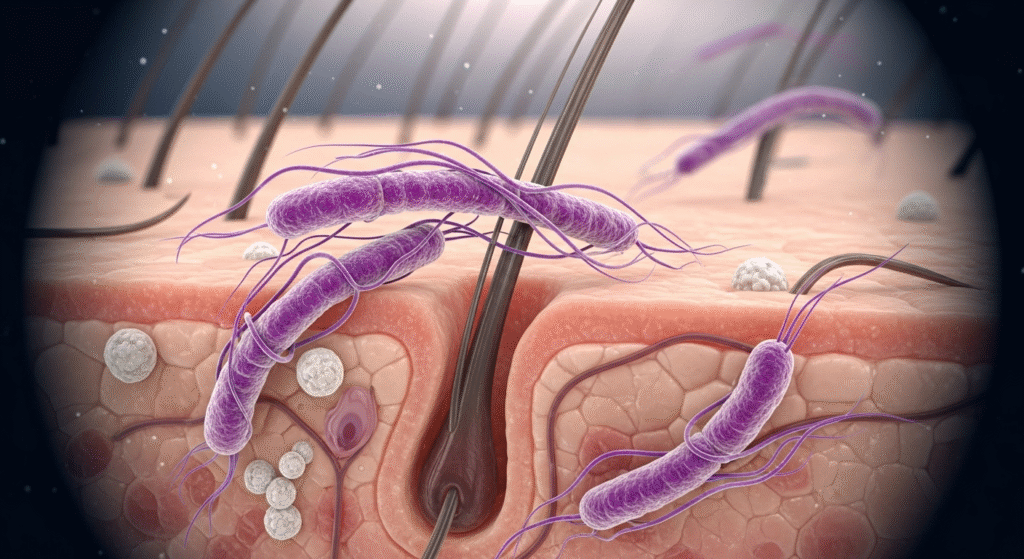
What Is H. Pylori and How Does It Affect the Body?
Helicobacter pylori (H. pylori) is a spiral-shaped bacterium that infects the stomach lining. It’s incredibly common—affecting up to 50% of the global population.
Typical symptoms include:
- Bloating
- Acid reflux
- Indigestion
- Stomach ulcers
H. pylori disrupts gut function and increases inflammation. Over time, it can lead to nutrient malabsorption and systemic effects, which may influence hair growth and quality.
Does H. Pylori Cause Hair Loss?
Research suggests that H. pylori may indirectly contribute to hair loss by interfering with the body’s ability to absorb essential nutrients. These deficiencies are critical to hair follicle health and regeneration.
Here’s how it might work:
- Chronic infection inflames the gut lining, reducing absorption of iron, vitamin B12, and folate.
- This can trigger telogen effluvium, a form of temporary hair shedding linked to physiological stress.
- Some experts propose a gut-autoimmune-hair loss axis, where gut imbalance may worsen autoimmune responses affecting the scalp.
Nutritional Deficiencies Caused by H. Pylori That May Lead to Hair Loss
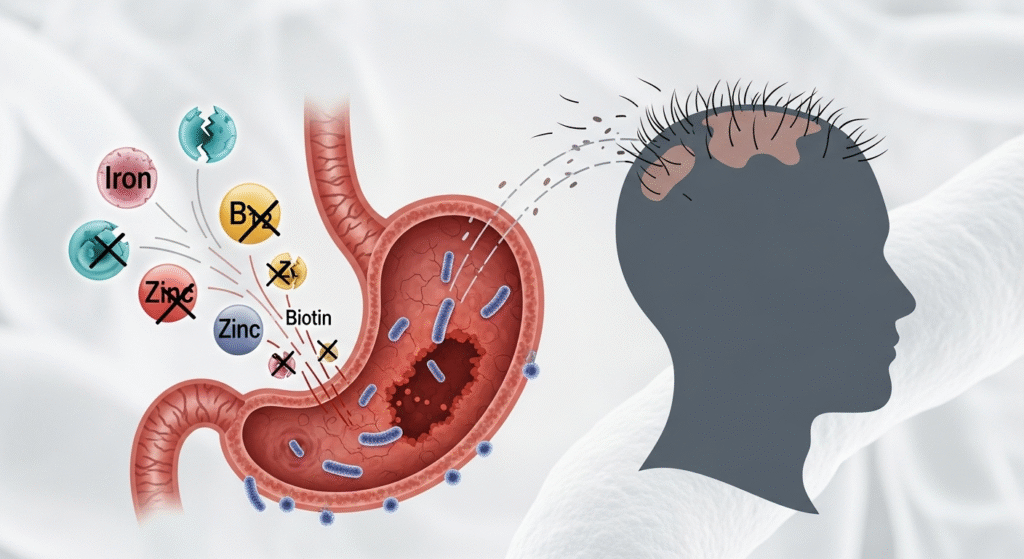
Hair relies heavily on a consistent supply of nutrients. H. pylori can interfere with that supply by damaging the stomach’s ability to absorb:
- Iron: Iron-deficiency anemia is strongly linked to diffuse hair thinning.
- Vitamin B12: B12 is vital for red blood cell formation and follicle oxygenation.
- Folate: Supports healthy cell turnover, including those in the scalp.
- Protein: Chronic infection may reduce appetite and impair protein intake.
Other Possible Explanations for Hair Loss in H. Pylori Patients
If you’re being treated for H. pylori and noticing hair loss, these additional factors may be involved:
- Antibiotics and PPIs: Treatment may temporarily disrupt the gut microbiome or reduce nutrient uptake.
- Stress and anxiety: Chronic digestive symptoms often increase mental stress, which is a known trigger for telogen effluvium.
- Autoimmune overlap: Conditions like Hashimoto’s thyroiditis or celiac disease often coexist with H. pylori and contribute to hair loss.
- Genetic hair loss: You may also be experiencing pattern baldness unrelated to infection.
How to Diagnose and Treat H. Pylori-Related Hair Loss
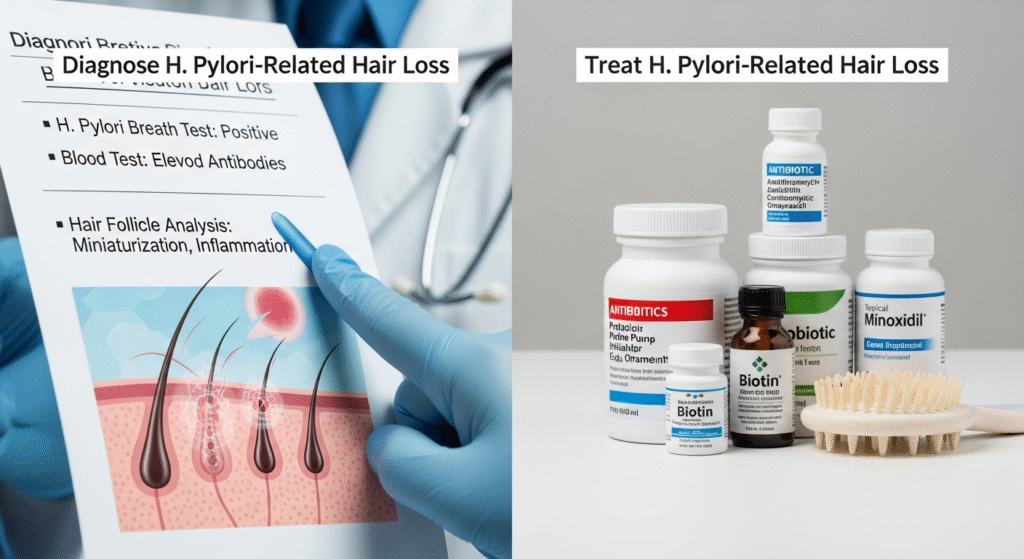
Step 1: Confirm the infection.
- Urea breath test
- Stool antigen test
- Endoscopy with biopsy (in severe cases)
Step 2: Eliminate the bacteria.
- Triple therapy: 2 antibiotics + a proton pump inhibitor (PPI)
- Quadruple therapy if resistance is suspected
Step 3: Support recovery.
- Reintroduce gut-healing foods (fermented foods, fiber)
- Supplement iron, B12, and folate as needed
- Monitor hair regrowth over 3–6 months
Proactive Tips to Protect Hair Health During H. Pylori Treatment
- Track nutrient levels: Regular blood tests for ferritin, B12, folate
- Eat a hair-friendly diet: Leafy greens, lean protein, omega-3 fats
- Use gentle hair products: Avoid harsh shampoos and heat styling
- Consider topical support: Products like minoxidil may help speed regrowth (with doctor approval)
- Manage stress: Try yoga, mindfulness, or therapy during recovery
FAQs
Can H. pylori infection directly cause baldness?
Not directly. It contributes indirectly through nutrient loss and inflammation.
How long after treating H. pylori does hair regrow?
You may see improvement in 3–6 months post-treatment, depending on your health.
Should I take hair supplements during treatment?
Yes—especially iron, B12, and folate—after consulting your doctor.
Can antibiotics for H. pylori cause more hair loss?
Rarely, but temporary shedding can occur due to treatment stress or gut disruption.
Is hair loss from H. pylori permanent?
Generally no. Hair often regrows once nutrient balance is restored and infection is cleared.
Conclusion
Does H. pylori cause hair loss? While not a direct cause, this stomach infection can set off a chain of events—nutrient depletion, inflammation, stress—that results in temporary hair shedding. The good news is that once the infection is treated and deficiencies are corrected, hair typically regrows.
If you suspect your gut health is affecting your hair, don’t ignore the signs. Testing and treatment can restore not only your digestion but your confidence too.
Struggling with hair loss and digestive symptoms? Book a consultation with Dr. Uzma Irfan, an ISHRS-certified surgeon in Islamabad today. We’ll help you get tested for H. pylori, rebuild your gut, and support your journey to full hair recovery.

